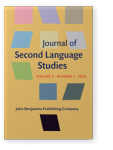Vol. 6:1 (2023) ► pp.146–182
The neural correlates of second language syntax
Implicit and explicit instruction
An important dimension that characterizes the contextual differences in second language acquisition (SLA) is the degree to which instruction is implicit or explicit. However, whether these differences in context play a role in determining the neural activity to process L2 grammar has not been well characterized. The present study investigated this issue by comparing the neural regions activated in response to novel L2 syntactic rules acquired under conditions of implicit and explicit instruction. In addition, participants’ declarative and procedural memories were measured to better understand the mediating effect of memory during learning under different conditions. Explicitly and implicitly instructed learners showed statistically indistinguishable behavioral performance. Region of interest (ROI) analysis also revealed that the task activated both declarative and procedural memory structures suggesting that instructional context did not affect the recruitment of memory systems when processing L2 syntax.
Article outline
- 1.Introduction
- 2.Review of literature
- 2.1Theories of L2 neurocognition: The declarative/procedural model
- 2.2Relevant empirical neurocognitive research on the implicit-explicit issue
- 3.Method
- 3.1Participants
- 3.2Materials: The mini-language (Mini-French)
- 3.3Procedure
- 3.3.1Training and practice phase
- 3.3.2Testing phase
- 3.3.2.1Grammaticality judgment task (GJT)
- 3.3.2.2Measure of declarative memory learning ability
- 3.3.2.3Measure of procedural memory learning ability
- 3.3.2.4Debriefing questionnaire
- 3.4MRI data acquisition
- 3.5Analyses
- 3.5.1Behavioral data analysis
- 3.5.2fMRI data analysis
- 3.5.2.1Region of interest (ROI) analyses
- 3.5.2.2Analyses of the relationship between the brain and behavior
- 4.Results
- 4.1Behavioral results
- 4.2fMRI results
- 4.2.1Relationship between the brain and behavior
- 5.Discussion
- 6.Limitations and future research
- 7.Conclusion
- Acknowledgements
- Conflict of interest statement
-
References
